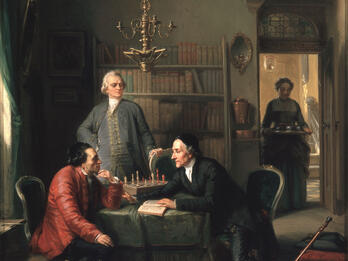Intellectual and Religious Thought
The Jewish encounter with modernity from 1750 to 1880 engendered a deeply ideological age. Advocates of enlightenment, of liberalism, of revolution against old regimes fought bitter polemics with forces seeking stasis, stability, tradition, and the familiar strata of privilege.
The Jewish encounter with modernity from 1750 to 1880 engendered a deeply ideological age. Advocates of enlightenment, of liberalism, of revolution against old regimes fought bitter polemics with forces seeking stasis, stability, tradition, and the familiar strata of privilege. The status of Jews, as individuals and as communities, was one of the central stakes in this tug of war. In some parts of the world (e.g., the United States, France), revolutions succeeded in toppling the existing system and ushering in, if not a completely new beginning, then certainly conditions for radically reshaping old hierarchies. In other nations, traditionalists stood firm and repelled most forms of change. Jews were passionately involved in the fray, as they considered the merits and losses of the changes being demanded of them.
Jewish enlighteners advocated reshaping the contours and content of Jewish knowledge. They sought to broaden and modernize Jewish school curricula, introduce avenues to training for new types of professions, and expand scientific and humanistic horizons of Jews more generally. Religious leaders debated proposed changes in synagogue services and customs and emerged with polemical literature brimming with ideas about which elements of the Jewish religion were (still) essential and which could be eliminated or modified. New denominations were formed and new forms of ecstatic Judaism were born in this period of religious ferment.
Enlightenment, Emancipation, Assimilation
The emergence of new definitions of citizenship, of state, and of individual identities within them, along with ideas formulated by the leading European philosophers and statesmen of the age, presented a direct challenge to Jewish educated elites—writers, thinkers, teachers, and rabbis. Western European states offered inclusion into the polity if Jews changed enough about themselves to lose their distinctiveness. Governments would reverse centuries-long policies of discrimination that kept Jews from acculturating. In return, the states expected Jews to abandon their intense devotion to a distinctive Jewish culture, although they would be allowed to retain their religious identity.
Russia fluctuated between promoting strategies aimed at pressuring the Jewish masses to convert to Orthodox Christianity and policies designed to turn them into enlightened subjects, however defined. They were to be educated alongside everyone else, to speak and write the language of the nations, and to pursue economic and professional activities that were deemed “productive.” Russian society itself was deeply polarized between aristocrats and peasants, with a scant middle class for Jews to integrate into. Nevertheless, Jewish thinkers of all stripes saw this offer of redemption as a momentous turning point, away from a past filled with persecution and segregation, toward a new age of acceptance and inclusion. Most felt that this was an offer they could not refuse, and they were filled with a sense of urgency. They penned hundreds of passionate essays, each claiming to have the very formula that would change Jews sufficiently to enable them to participate in the new society while retaining aspects of their Jewish identities.
By the first decades of the nineteenth century, as more Jews were admitted to universities, a cadre of academically trained scholars and leaders began to emerge. For a long time, their devotion to scholarship went unreciprocated, as very few appointments in academe were granted to professing Jews. Nevertheless, once the gates had opened, Jews made crucial contributions to many emerging academic fields and turned their critical sense to Jewish history and texts as well.
Enlightenment and Jewish Social Change
In their manifold works, European Jewish writers addressed several readerships. They wrote to convince themselves, to persuade their fellow Jews, and to prove to the gentile intellectuals that they were serious about transforming a people whose habits, religion, and culture had been shaped for millennia as a society apart. In contrast to the “drift and defection” pattern of disengagement, members of the literate vanguards were the first to articulate their struggle to define precisely which elements of Jewishness and Judaism were worth conserving, which needed transformation in order to remain vital, and which should be consigned to oblivion. Some proponents of change advocated for their vision with conscious deliberation and programmatic manifestos; others advocated resistance to all changes with equal awareness and staunch positions that nevertheless signaled that they were responding to a new set of circumstances.
Jewish responses to the conditional welcome into equality in the legal, civic, and social spheres included total abandonment of Judaism (in the nineteenth century this still usually meant conversion to another religion), programs to enlighten the Jewish masses, movements of spiritual renewal, and the division of Western Judaism into different denominations. These positions mattered immensely to those who advocated for them; they articulated and disseminated their ideas with ferocious zeal. They hoped to reshape the very concepts and images of Jews and Judaism for all time. Many believed that they were the first to face such a radically reconfigured world, the first to take the measure of all of Jewish culture in all the preceding ages and judge it on the altar of the future unknown.
The Posen Library aims to include an array of voices from this period, the well known alongside the obscure, ranging across an eventful century and a half, across diverse contexts and political circumstances. German Jews were perhaps the most self-conscious and highly articulate in this period; although there was often a time lag of decades before their works were translated and taken up, their writings were hugely influential in distant parts of the Jewish world. Access to education and literacy—academic, scientific, rabbinic—was very limited for women. They are less present in this period of the Posen collection than in others because in every one of the ideological movements, from Hasidic thought and rabbinic scholarship to religious denominationalism and pedagogical reform, men’s voices dominated the discourse.


